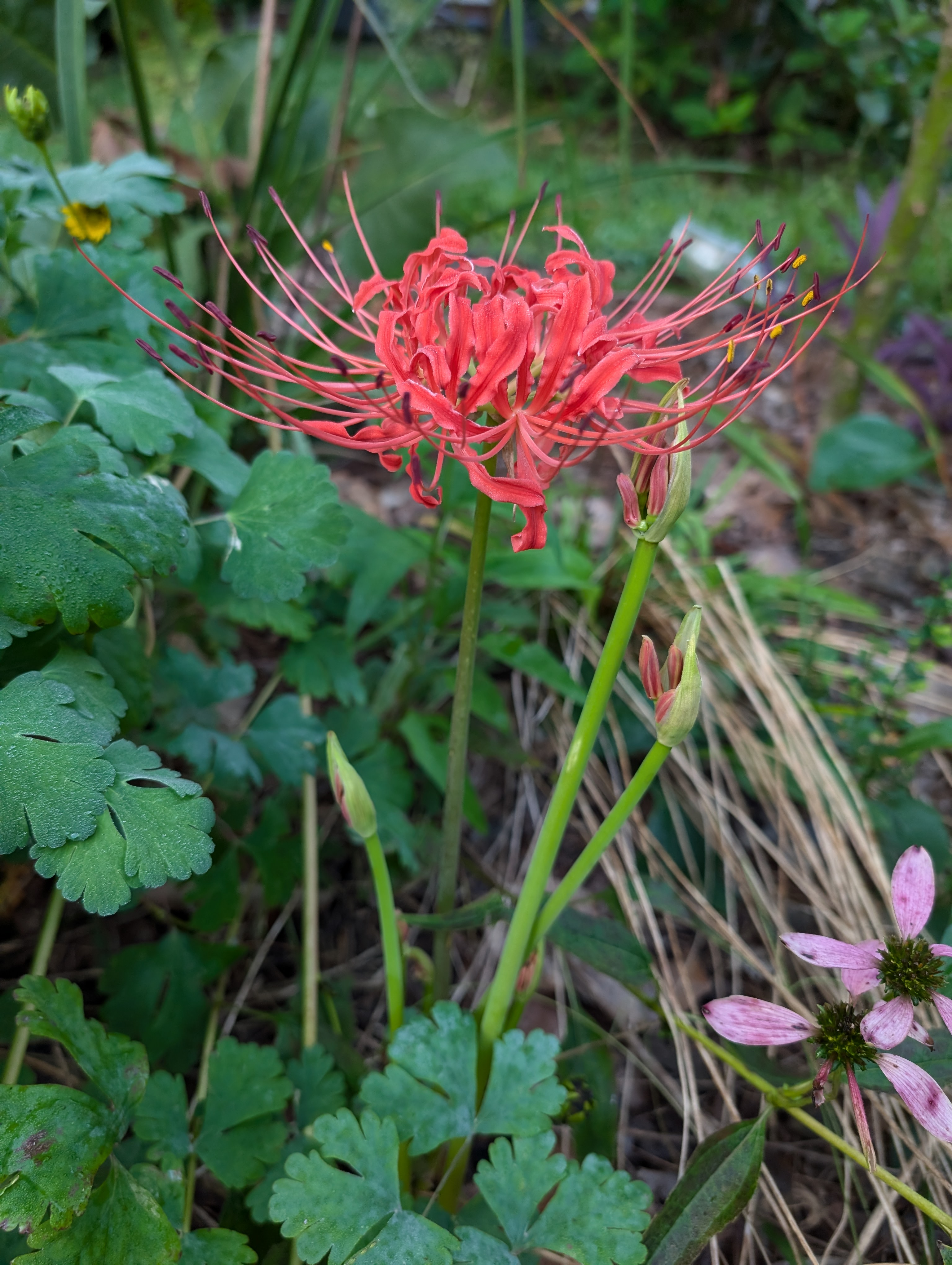Surprise, There Is a Naked Lady Hurricane (Aka Lycoris Lilies Are Up)!
go.ncsu.edu/readext?1028444
en Español / em Português
El inglés es el idioma de control de esta página. En la medida en que haya algún conflicto entre la traducción al inglés y la traducción, el inglés prevalece.
Al hacer clic en el enlace de traducción se activa un servicio de traducción gratuito para convertir la página al español. Al igual que con cualquier traducción por Internet, la conversión no es sensible al contexto y puede que no traduzca el texto en su significado original. NC State Extension no garantiza la exactitud del texto traducido. Por favor, tenga en cuenta que algunas aplicaciones y/o servicios pueden no funcionar como se espera cuando se traducen.
Português
Inglês é o idioma de controle desta página. Na medida que haja algum conflito entre o texto original em Inglês e a tradução, o Inglês prevalece.
Ao clicar no link de tradução, um serviço gratuito de tradução será ativado para converter a página para o Português. Como em qualquer tradução pela internet, a conversão não é sensivel ao contexto e pode não ocorrer a tradução para o significado orginal. O serviço de Extensão da Carolina do Norte (NC State Extension) não garante a exatidão do texto traduzido. Por favor, observe que algumas funções ou serviços podem não funcionar como esperado após a tradução.
English
English is the controlling language of this page. To the extent there is any conflict between the English text and the translation, English controls.
Clicking on the translation link activates a free translation service to convert the page to Spanish. As with any Internet translation, the conversion is not context-sensitive and may not translate the text to its original meaning. NC State Extension does not guarantee the accuracy of the translated text. Please note that some applications and/or services may not function as expected when translated.
Collapse ▲This isn’t a peep show or a meteorological report! We are here to celebrate the horticultural event of the year: the Lycoris radiata are popping up around Lee County. Known by the common names surprise lily, hurricane lily or naked ladies, these brilliant red blooms seem to appear from nowhere, but we’re here to reveal the surprise.
What’s in a Name
Gardeners are notorious for giving plants memorable names; unlike botanists who can make us cringe with their Latin- or Greek-derived names. While the scientific name (from the botanist) is critical to understand how everything is related to each other, the common name (from the gardener) tells us how the plant relates to its humans. Lycoris presents us with three great common names. Let’s explore them and how they can tell us about this amazing group.
Genus Lycoris, the surprise lilies
Surprise lilies are in the genus Lycoris, and hail from East Asia, where there are about nine recognized species. The flower spikes emerge in the late summer to early fall before the leaves, giving them their name. The flowers range from red to pink to yellow, and some flowers can even be tipped with blue. The flower stalks can be between 12” and 28” tall.
Lycoris radiata, the red surprise lily, is probably the most abundant in Lee County, where you can find it around the foundations of old or forgotten homesites. They are easy to grow in well-draining soil in part shade to part sun. If you need to move them, wait until the flowers go down (mark the spot with a flag!) and then dig them up.
Not a True Lily!
The surprise lilies, species in the genus Lycoris, aren’t actually true lilies (in the family Liliaceae). They are in the Amaryllis family, Amaryllidaceae, and thankfully so. This gives them an extra layer of protection from deer because the alkaloids in the tissues make them taste bad (and be poisonous to) hungry critters.
Hurricane Lily
The name hurricane lily comes from the timing of the flowers’ emergence after or around a hurricane in the late summer. One weather event that can crash the Fair is a hurricane. Looking back, Lycoris traditionally come up around the Lee Regional Fair time in our area. How fortuitous that there is a Fair category you can enter yours in (so keep an eye on the Exhibition Hall dates), if the hurricanes don’t get them!
Naked Ladies
The common name “naked ladies” leaves much to the imagination, but really refers to the long, skinny flower spikes that emerge from the ground before a “skirt” of foliage emerges.
to the long, skinny flower spikes that emerge from the ground before a “skirt” of foliage emerges.
Juniper Level Botanic Garden right up the road in Wake County, NC, has the largest collection of Lycoris in the Western Hemisphere, and is leading the way in understanding this elusive group of plants. Through growing the plants (more than 1,100 clones!), the staff there have come to understand there is a lot of confusion about the names used in horticulture, but the group boils down to when the foliage emerges. Some species have foliage that emerges in the fall after they finish flowering (about four species) and some have foliage that waits for it to warm up in the spring (five species). This “spring foliage” group is hard to grow in our climate because our fluctuating winter temperatures confuse the plants.
~~~
Whatever you choose to call them, Lycoris are a delight in the late summer and remind us that there is a reason to smile, even after the worst summers. It makes sense that one of the names the Chinese have for them is, ‘And the Earth smiles.’
Resources:




